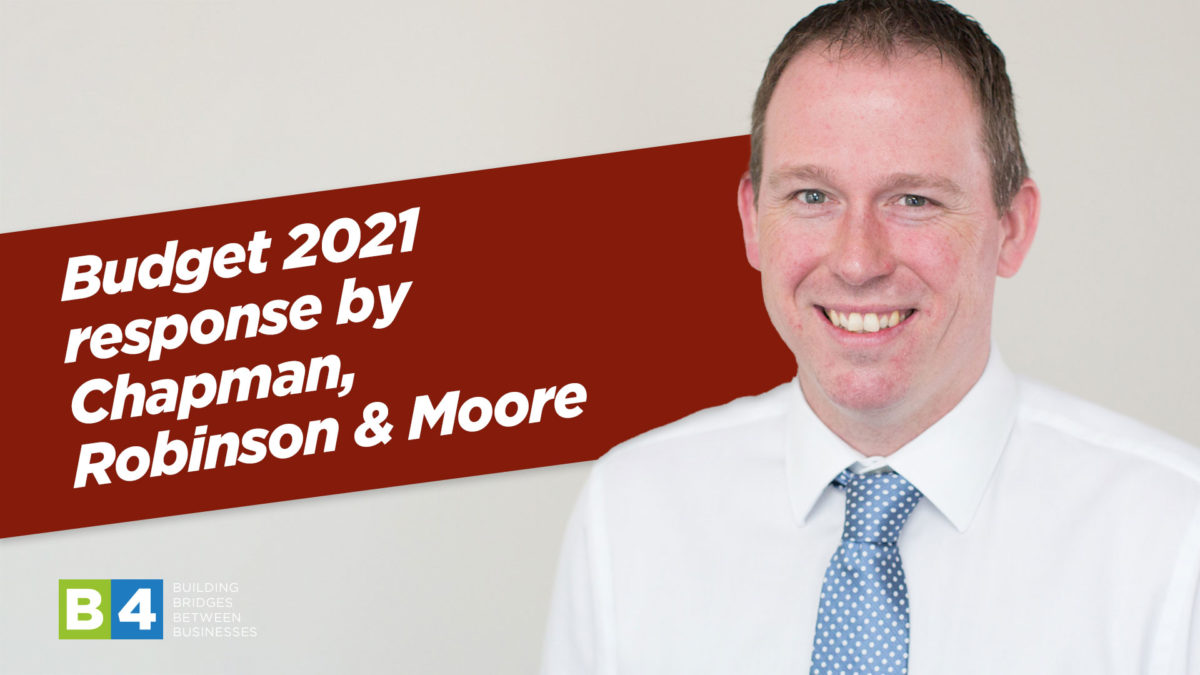
Budget 2021 response by Chapman, Robinson & Moore
Chancellor Rishi Sunak presented the 2021 Autumn Budget on 27th October 2021, though the number of policies announced in advance made many commentators wonder if anything new would be mentioned in the actual budget speech!
It is worth noting that in recent years, it has become the normal policy for the full Budget to be delivered in October with most announcements taking effect from the following April, with the Spring Statement being fundamentally an economic update.
However, you will no doubt be aware that the Spring Statement in 2021 sat in the place of the October 2020 Autumn Budget, which was postponed due to the ongoing impact of Covid-19. Therefore, many key tax changes were already known, even before the releases in the lead up to the Budget. We are assuming that from 2022 onwards we will resume the pattern of the Autumn Budget containing the majority of substantive tax announcements, though time will tell.
To see the main announcements, a reminder of other changes previously announced, with practical guidance on these points and how they may affect you and your business, please read below:
Employers
Increase in National Minimum Wage and National Living Wage rates
Business
Corporation tax rate change (announced in Spring Budget 2021)
Corporation and income tax relief on losses (announced in Spring Budget 2021)
Personal tax and other announcements
Extension of Capital Gains Tax return and payment period for disposal of residential property
Postponement of MTD and new penalty regime for Income Tax
Employers
Increase in National Minimum Wage/National Living Wage
It was confirmed shortly before the Budget that the National Minimum Wage and National Living Wage rates would increase substantially from 1 April 2022:
- National Living Wage for over-23s: From £8.91 to £9.50 an hour
- National Minimum Wage for those aged 21-22: From £8.36 to £9.18
- National Minimum Wage for 18 to 20-year-olds: From £6.56 to £6.83
- National Minimum Wage for under-18s: From £4.62 to £4.81
- The Apprentice Rate: From £4.30 to £4.81
Planning point: The increased wage rates will result in some employers (especially those with mainly part time employees) breaching the employer NIC threshold for the first time. We would remind you that you will likely be able to claim the Employment Allowance, which exempts most employers from the first £4,000 of employer NIC per tax year.
Increase in National Insurance (NIC) for employees and self-employed, and increase in dividend taxation (announced September 2021) – The Health and Social Care Levy
As announced in the Spring Budget, from April 2022, the Health and Social Care Levy (which is expected to be a separate charge from April 2023) will be given temporary effect in the interim by increasing by 1.25% the rates of Class 1 NIC (both employee and employer), Class 1A NIC on most Benefits in Kind, and Class 4 NIC paid by the self-employed and partnerships.
It is worth noting that employed and self-employed earners over state pension age will not pay the extra NIC in 2022/23, but will be due to pay the new levy which is intended to replace it from April 2023. Employers will of course pay the extra 1.25% NIC charge for these earners where relevant.
Recipients of dividends in excess of the £2,000 dividend allowance will also see a 1.25% increase in their tax rate from April 2022 across all tax bands.
Surprisingly, the main area of income which has not been impacted by this measure is the recipients of rental income.
The amounts raised are to be ring fenced for spending on social care and the NHS rather than being included in general funds.
Planning point: For employers, this effective increase in NIC ongoing means the value of using salary sacrifice schemes for qualifying benefits such as pension contributions is increased further. £1,000 sacrificed from salary for pension contributions by an employee will save the employee £132.50 NIC and the employer £150.50 from April 2022 (assuming the Employment Allowance is already fully utilised and the employee’s earnings are in the main band) this is a combined 28.3% improvement. It is possible to set up your employee’s regular contributions as a salary sacrifice, as well as the more traditional flexible benefits approach for extra contributions (e.g. in lieu of a cash bonus in whole or in part).
Planning point: The dividend taxation increases are the second increase in recent times on this form of income. It is even more important to fully consider legitimate ways you can ensure that dividends are spread through the family to utilise dividend allowances and basic rate bands/personal allowances for as many members of the family as possible. However, it is critical that any planning is correctly executed, so please do seek professional advice.
Planning point: Many business owners will be considering declaring a dividend prior to 5 April 2022 to lock in the current tax rates and crediting it to their director’s loan account, even if the funds are withdrawn later. Of course, care must be taken not to breach the various tax thresholds (£50,270 higher rate, £100k loss of personal allowance and £150k additional rate) unnecessarily. Please also bear in mind that by bringing forward the dividend date, you also being forward the tax payment date. This will also potentially impact payments on account, so you may need to claim to reduce these.
Business
Corporation Tax changes – announced in Spring Budget
The headline of the tax raising part of the 2021 Spring Budget was the announcement of an increase in Corporation Tax from April 2023. This will be a significant rise from the current historically low rate of 19% to 25%.
We see a return to the old system of a small companies’ rate, with profits of up to £50k being taxed at 19%, and a sliding scale for profits up to £250k, where the 25% rate is fully in effect.
Where a company has a year end other than March, the year, for tax purposes, is effectively split into two, with the period up to 31 March 2023 taxed under the old rules (basically 19%), with the remaining months subject to the new rules, with the £50k and £250k limits pro-rated (e.g. 9/12ths for a December 2023 year-end).
Planning point: The marginal rate of tax for profits in the band £50k-£250k will be 26.5%. This means that for companies with profits in this band, the effective after-tax cost of spending money on tax deductible items reduces. This may mean revisiting the salary/dividends calculations, and also considering timing of items like staff bonuses, directors’ pension contributions and timing of discretionary spend on marketing, websites and capital expenditure.
Planning point: We do not currently have final legislation, but we understand £50k and £250k profit bands will be restricted where you have more than one company in a group, or under common control. If this is the case, there would be an advantage in ensuring careful allocation of losses, and managing (where possible) profit levels between group companies to minimise the overall tax charge within a group. The expectation is that where there are multiple companies under common control, this limit will be split equally between them.
Planning point: The small company rate is not expected to apply to ‘close investment holding companies’, technical definition here
https://www.legislation.gov.uk/ukpga/2010/4/section/34/enacted. The plain English translation would be a company which is not a trading company, a company letting out property on a commercial basis to non-connected third parties, or a simple holding company of groups meeting the other criteria.
Loss relief – announced in Spring Budget 2021
In a measure effective for both income tax and corporation tax, losses in 2020/21 and 2021/22 will be able to be carried back up to three years (normally one) to secure tax repayment to assist cashflow, rather than having to wait to offset against future profits.
For example, a business that loses £100k in 2021 which normally makes profits of £40k would previously be able to carry back £40k loss and obtain a tax refund of the amount paid in 2020. The remaining £60k loss would be carried forward to set against future profits. Under the new scheme, the loss would be carried back £40k to 2020, £40k to 2019 and £20k to 2018, meaning a tax refund (or offset of amounts unpaid) is available immediately.
Losses are subject to a cap of £2m, which is split amongst group companies where there is a group structure.
Planning point: If your business will be showing a loss for either of these two years, which would include a technical loss caused by Annual Investment Allowance or the “super deduction” (see below), any refund offset against prior years’ tax can only be made once your accounts have been prepared and submitted, so please get your accounts completed as soon as possible after the year end to accelerate this cash flow benefit.
“Super deduction” for capital investment (announced in Spring Budget 2021) and Annual Investment Allowance extension
For two years from April 2021 to March 2023, a First Year Allowance of 130% will be available for expenditure qualifying for capital allowances in the main pool, or 50% for expenditure in the special rate pool.
In other words, for every £100 you spend on new qualifying plant and machinery, you get to reduce your taxable profits by £130.
This will only apply for corporation tax, not for income tax payable by sole traders and partners. Only expenditure on new equipment, not second hand, will qualify. Cars will not qualify for relief (though vans do) and no claim is possible in your final period of trading if relevant.
Since this is a First Year Allowance, there is no cap on this, unlike the Annual Investment Allowance.
One unexpected announcement in the Autumn Budget was the extension of the £1m Annual Investment Allowance to 31 March 2023 (previously due to revert to £200k from 1 January 2022).
Planning point: A 19% Corporation tax rate gives effective tax saving of 24.7% on investment. This cleverly gives you very nearly the same effective tax relief for capital expenditure incurred now as if you claim Annual Investment Allowance from April 2023 with a 25% corporation tax rate. Note though that if you have taxable profits in the ‘marginal band’ of 26.5% from April 2023, there may be an advantage in terms of rate of tax relief in deferring capital expenditure until April 2023 where possible/desirable (26.5% vs 24.7%).
Planning point: The Annual Investment Allowance is now to continue at a level of £1m until 31 March 2023 (then to revert to £200k), so you can still claim this instead of the super deduction. This would still be a rational choice where you have special rate pool assets, since these will attract super deduction at 50% or AIA at 100%. Also, second hand purchases (other than cars) may qualify for AIA, but not super deduction.
Planning point: The rate of the super deduction will require apportioning if an accounting period straddles 1 April 2023. The rate should be apportioned, based on days falling prior to 1 April 2023 over the total days in the accounting period. Effectively, you time apportion the super deduction 30% enhancement, so a December 2023 year end is (90/365 x 30%) 7.4% enhancement.
Research and Development Tax credits
The Chancellor announced that expenditure on cloud computing and data would qualify for relief from April 2023, and that from the same date, measures would be put in place to focus R&D relief on spend made in the UK rather than overseas.
This slight extension will be welcomed by businesses incurring these costs, but more widespread reassurance will be felt by the implied commitment that the scheme is to continue fundamentally on an ‘as is’ basis.
Planning point: Many companies fail to claim R&D Tax Credits to which they are entitled. If your company incurs costs in overcoming technical uncertainties, then you may have a valuable claim to make. If you would like to arrange a free review of your circumstances, please contact Alan Sowden on 01865 379272. Alternatively, please see this article on our website for sector specific examples of qualifying cases: https://crmoxford.co.uk/rd-tax-relief-typical-claims-see-briefing-notes/
Personal tax and other announcements
Extension of Capital Gains Tax return and payment period for disposal of residential property
A welcome relaxation was announced for those disposing of residential property. Since April 2020, taxpayers have had just 30 days from completion of sale of a residential property (unless covered by exemption as main residence etc) to report on and pay the Capital Gains Tax arising. For properties where completion is on or after 27 October 2021, this period is now extended to 60 days.
Planning point: We would always recommend that you gather all necessary paperwork in advance of sale in order that you may meet the deadline with minimal stress. This also allows you to have a good estimate of the tax payable before you complete the sale.
Postponement of Making Tax Digital (MTD) and new penalty regime for Income Tax
Planning point: We would recommend talking to your accountant well in advance of the mandated date of April 2024 in order that any necessary systems for your record keeping may be put into place before the penalty regime begins.
Please note that this is designed as a generic guide rather than specific advice. As always, it is impossible to include every nuance in a publication such as this, so if you have a question about how a given measure may affect you or your business, or if you have a general tax query, please get in touch with us on 01865 379272.
© Copyright 2021 Chapman Robinson & Moore Ltd Accountants, Oxfordshire
More in Accountants

Why having an audit can boost your business
Many directors will wince at the prospect of an audit, seeing it as a necessary evil to meet statutory obligations.

FRC Proposes Major Overhaul of Auditing Standards
In a bold move, the Financial Reporting Council (FRC) has unveiled proposed changes to auditing standards that could have a major impact on the financial world, according to chartered accountants and business advisors Whitley Stimpson.

Whitley Stimpson shines as finalist for top national award
Service Charge Accountancy specialist Jonathan Walton of Whitley Stimpson has been recognised for his outstanding work in the field by being shortlisted for a prestigious property industry award.
From this author

Fun and fundraising pass the winning post together at CRM Race...
More than 100 excited horseracing fans packed into Yarnton Road Football Club for the CRM Charity Race Night on Friday 30 September. The atmosphere was full of competitive enjoyment and an amazing total was raised for CRM’s 2022 charity partner – Tiny Tickers.

CRM Summary: The Chancellor’s September Statement
Chancellor Kwasi Kwarteng delivered his “mini Budget” on 23 September 2022.

Why a personal budget is so important – and how to...
As well as making the numbers work for our clients, CRM’s recently qualified accountant Loren Forbes is a big fan of personal budgeting and she is passionate about spreading the word to help people manage their money better.

